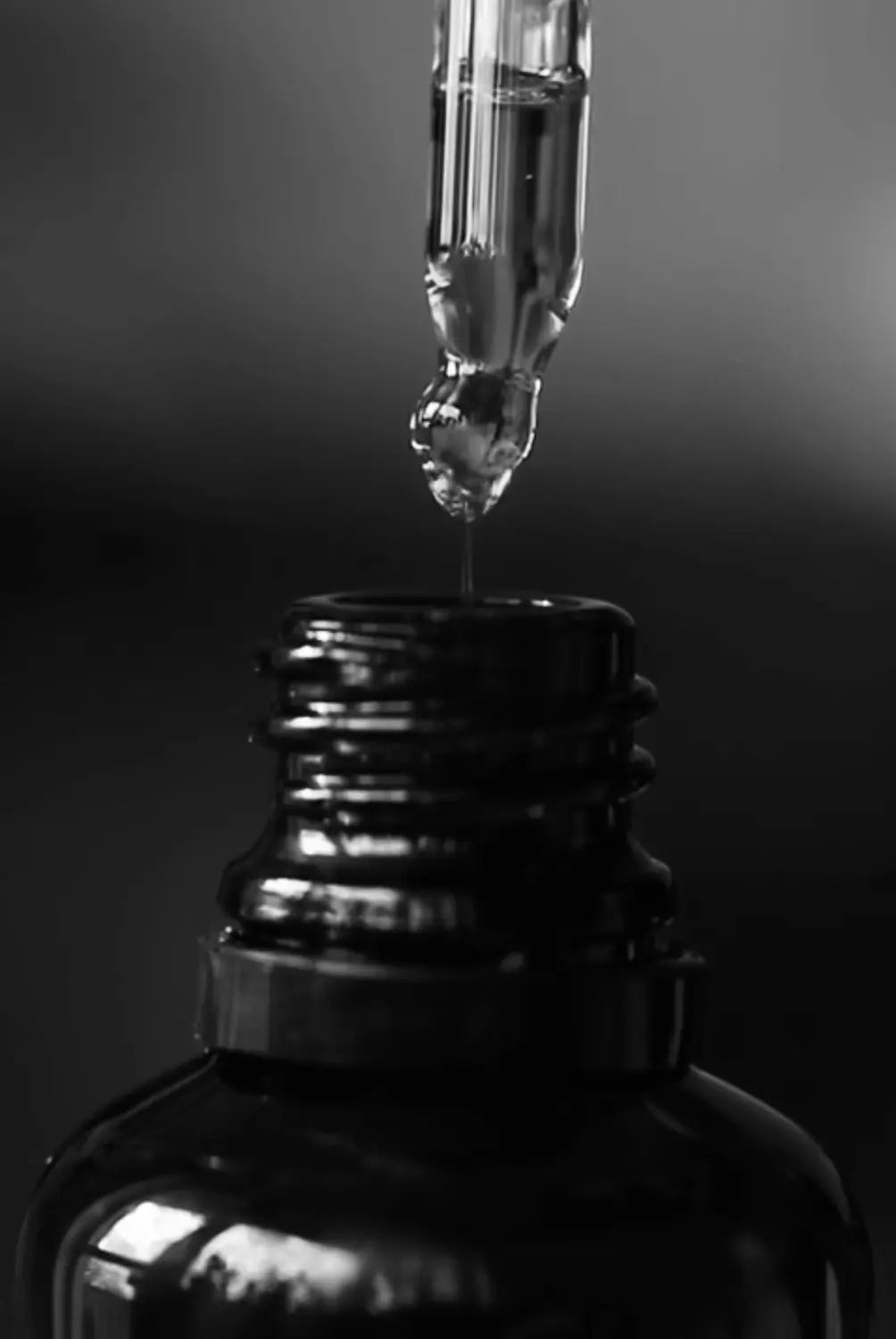
The Gentle Power of Oils for Acne-Prone Skin
Part I: The Myth of “Oil-Free”
For decades, acne-prone skin has been treated like an enemy to be conquered. We were told that oil was the root of all breakouts—that the only path to clarity was to strip our skin bare.
We bought into the message.
We reached for foaming cleansers that promised a “squeaky clean” finish.
We soaked our faces in toners that stung as they evaporated.
We filled our cabinets with “oil-free” moisturizers, convinced they were the only safe harbor.
And still, our skin did not heal.
Instead, it grew tighter. Flakier. Angrier. In trying to starve it of oils, we deprived it of its most essential building blocks. The result was a vicious cycle: cleanse, strip, react, treat, break out, repeat.
This is the great irony: the ingredient we were taught to fear—oil—is also the ingredient most capable of restoring balance. Where synthetics strip, oils replenish. Where foams inflame, oils calm. Where “oil-free” moisturizers dilute, oils deliver.
The truth is simple but radical: oil was never the enemy. The wrong oils were.
Part II: Why Oils Work with Acne-Prone Skin
Oils are not the enemy—they are the most faithful allies your skin has ever known. Where conventional formulas overwhelm with synthetics and water, whole-plant oils offer a chemistry that is already written into the skin’s design.
Every drop carries what the skin barrier craves: essential fatty acids to rebuild its structure, antioxidants to shield against stress, and phytochemicals that echo the skin’s own language. This is why oils don’t fight the skin—they harmonize with it.
When chosen with care, oils can:
- Dissolve excess sebum and impurities gently, without the harsh surfactants that leave skin parched.
- Soothe inflammation with naturally occurring anti-inflammatory compounds, quieting the redness that often follows breakouts.
- Fortify the barrier, making skin more resilient and less prone to recurring flare-ups.
- **Deliver hydration in its purest form—**not diluted with fillers or preservatives, but concentrated and intact.
This is where oils transform from simple moisturizers into a philosophy: a minimalist approach to skin health. A single, well-crafted oil can cleanse, calm, hydrate, and protect—removing the need for the dozen bottles crowding a shelf.
Minimalism is not about doing less for your skin. It’s about removing what doesn’t belong, so the essentials can do their work.
Part III: A Personal Note
When I was younger, my skin was reactive and blemish-prone. I spent years layering foaming cleansers, benzoyl peroxide, and “miracle” serums. My face was often raw, dry, and yet still oily.
One winter, I tried something different. I reached for a small bottle of Balm of Gilead. I massaged it gently into my skin at night, rinsed with warm water, and left only a thin veil behind.
The shift was profound. My breakouts calmed. My cheeks softened. Instead of fighting my skin, I was finally supporting it.
That moment became the seed for Trinity Lumière.
Part IV: The Science of Oils for Acne
Not all oils are created equal. Some clog, some heal. The difference lies in their molecular weight, their fatty acid profile, and their naturally occurring compounds. When chosen with intention, oils become a precise tool for balance—not a blanket risk.
- Jojoba Oil – Perhaps the most skin-intuitive of all oils. Its structure so closely resembles human sebum that the skin recognizes it as its own. This means jojoba doesn’t just sit on the surface—it helps regulate oil production, signaling overactive pores to slow down.
- Hemp Seed Oil – Called the “drying oil” for acne-prone skin, hemp seed is featherlight, quick to absorb, and has one of the lowest comedogenic ratings. Its high concentration of omega-3 and omega-6 fatty acids makes it profoundly calming for inflamed, irritated breakouts.
- Black Cumin Seed Oil – Revered since ancient times as a remedy “for everything but death.” Rich in thymoquinone, it offers both antibacterial and anti-inflammatory action—two qualities acne-prone skin needs most. It works to clear congested pores while soothing the redness around them.
- Meadowfoam Seed Oil – A quiet powerhouse. Stable, long-lasting, and deeply emollient, meadowfoam locks in hydration without heaviness. It makes an ideal foundation for moisturizers for dehydrated skin—especially when acne treatments have stripped the barrier.
- Balm of Gilead Infusion – Sacred, resinous, and central to TSORI. This rare infusion carries centuries of wisdom: anti-inflammatory, wound-healing, and barrier-repairing. Where science meets scripture, Balm of Gilead anchors our philosophy—an ingredient that restores not only skin, but trust.
This is the science of oils for acne: not indiscriminate use, but intentional, minimalist pairing. The right oil, in the right place, at the right time.
Graph: Comedogenic Ratings of Popular Oils

Part V: Minimalism and Acne
The modern skincare industry thrives on complexity. Rows of serums, acids, masks, and peels—each promising to correct what the last one may have caused. But for acne-prone skin, “more” rarely means “better.” More steps often lead to more disruption. More disruption leads to more breakouts.
At TSORI, we return to what acne-prone skin is truly asking for: quiet, consistency, and restraint. This is the heart of minimalist skin care.
Minimalism means:
- A gentle cleanser for oily skin—oil-based, whole-plant, and filler-free—that removes impurities without disturbing the delicate microbiome.
- A natural moisturizer for dry skin—lightweight, non-comedogenic, and nutrient-dense—that hydrates without heaviness or residue.
- A streamlined, easy skin care routine that adjusts to what your skin needs today, not what marketing trends dictate.
This is where fewer steps lead to deeper results. Minimalism doesn’t mean neglect—it means precision. It is the difference between flooding the skin with noise and giving it exactly what it asks for.
In a culture of overconsumption, minimalism becomes a form of healing. For acne-prone skin, it is often the only way forward.
Part VI: The Barrier First Philosophy
Your skin is not broken. It is not defective. It is protective, alive, and constantly in conversation with the world around you. Acne is not a flaw to erase—it is a signal. A quiet alarm that something inside or outside is out of balance.
This is why at TSORI, every approach begins with a single priority: the barrier first.
The skin barrier—your body’s frontline shield—keeps pathogens out, retains hydration, and maintains equilibrium in ways no laboratory formula can replicate. When the barrier is weakened, everything else unravels: inflammation rises, sensitivity increases, and acne finds its way in.
Yet most so-called “clean skin care products” still dilute their formulas with water, preservatives, and synthetic esters that disturb the microbiome and strip away the very defenses the skin is trying to rebuild.
Oils, by contrast, work with the skin’s intelligence. They provide:
- Immediate replenishment of lipids, restoring what harsh cleansers and treatments strip away.
- Antioxidant protection, shielding vulnerable skin from oxidative stress and environmental triggers.
- Restoration of the acid mantle, the skin’s natural pH balance that keeps the microbiome resilient and acne-resistant.
This is why oils are not simply moisturizers—they are protectors. They rebuild what has been lost, so the skin can remember how to heal itself.
Graph: The Cycle of Harsh Acne Care vs. Gentle Oil Care

Part VII: Addressing the Myths
Myth 1: Oils cause breakouts.
Truth: The wrong oils can clog pores, but carefully selected, non-comedogenic oils are some of the safest natural beauty products for acne-prone skin.
Myth 2: Only drying agents fight acne.
Truth: Over-drying stimulates more oil production and worsens breakouts.
Myth 3: Oils are too heavy.
Truth: Lightweight oils like hemp seed and jojoba absorb quickly, leaving no residue.
Part VIII: Oils in Professional Organic Skincare
The future of organic professional skin care is moving away from synthetic “oil-free” formulas toward professional organic skincare rooted in whole-plants.
At TSORI, our formulations are:
- Waterless. 100% potency, no fillers.
- Whole-plant. No esters, no isolates.
- Minimalist. One formula, multiple benefits.
This approach is more than “clean beauty skincare.” It is sacred simplicity—skin care that honors biology instead of overriding it.
Chart: Ingredients in Conventional vs. TSORI Skincare

Part IX: Acne, Dryness, and Oils
Acne and dryness often arrive hand in hand—not because the skin is confused, but because it has been overworked. Harsh cleansers, acid peels, and drying spot treatments strip away more than excess sebum. They strip away the very lipids that hold the skin together.
The result? A paradoxical complexion: oily on the surface, but painfully dry and tight underneath. Dehydrated, inflamed, and constantly reaching for balance.
This is where oils step in as both natural moisturizers for dry skin and moisturizers for dehydrated skin. Unlike conventional creams that are padded with water and preservatives, oils don’t dilute their potency. They offer pure nourishment in every drop.
And they don’t just linger on the surface. Oils penetrate into the deeper layers of the stratum corneum, replenishing the lipid matrix and supporting long-term barrier repair. With consistent use, they help the skin shift from crisis mode back to stability.
This is why oils are more than hydration—they are correction. They serve as a natural remedy for dry skin on the face, a balm for the hidden wounds of acne: the flakes, the cracks, the invisible breaks in the barrier that no serum can patch.
Where harsh treatments punish, oils restore. Where acne leaves skin wounded, oils bring it back to wholeness.
Part X: A Simple Skin Care Routine for Acne-Prone Skin
Here’s an easy skin care routine built entirely from oils and whole plants:
- Evening Cleanse: Use an oil-based gentle face cleanser. Massage and rinse.
- Moisturize: Apply a few drops of a light botanical oil or elixir.
- Spot Support: Dab black cumin seed oil on inflamed areas.
- Weekly Care: Steam with chamomile or apply a Balm of Gilead balm mask.
That’s it. Simplicity.
Graph: Number of Products in Conventional Acne Routines vs. Minimalist Oil-Based Care

Part XI: Natural Skin Care Remedies for Acne-Prone, Sensitive Skin
For those with both acne and sensitivity, oils are uniquely suited. They can be:
- A gentle cleanser for oily skin that avoids surfactants.
- A natural moisturizer for dry skin that avoids synthetic fillers.
- A calming natural skin care remedy that supports both breakouts and redness.
This is why oils belong not only in natural beauty skincare, but in every natural personal care product that values restraint and biology.
Part XII: My Daughter’s Story
TSORI began with a wound. My daughter’s eczema resisted every cream and prescription. Out of desperation, I turned to Balm of Gilead—a biblical tree resin used for centuries as a natural skin care remedy. Infused in oil, it soothed what nothing else could.
From that success, I began to study. Oils became our language of healing. And eventually—our brand.
Part XIII: The Gentle Power in Contrast
Conventional acne products are loud. They foam, burn, tingle, and promise instant results. They are built on complication—serums layered over acids, spot treatments stacked on toners, an arsenal of bottles lined up like soldiers. Their language is one of force: strip, fight, kill.
Oils move differently. They are quiet. Ancient. Rooted in traditions that long predate the laboratory. Oils don’t shout over your skin—they listen to it. They don’t fight biology—they mirror it. They don’t chase trends—they remain timeless.
This contrast is the essence of clean skin care products that are truly clean. Not watered down with fillers. Not greenwashed with one token plant in a synthetic base. Oils arrive whole, unbroken, and intact—plants in their fullness, as nature intended.
And it is in this quiet strength, not in loud complication, that acne-prone skin finds its healing.
Part XIV: Final Takeaways
✔ Oils, chosen well, are allies for acne-prone skin.
✔ Minimalism outperforms excess.
✔ Natural beauty products can also be powerful treatments.
✔ Oils restore balance while synthetics disrupt it.
✔ TSORI exists as proof: less is not less. It is more.
